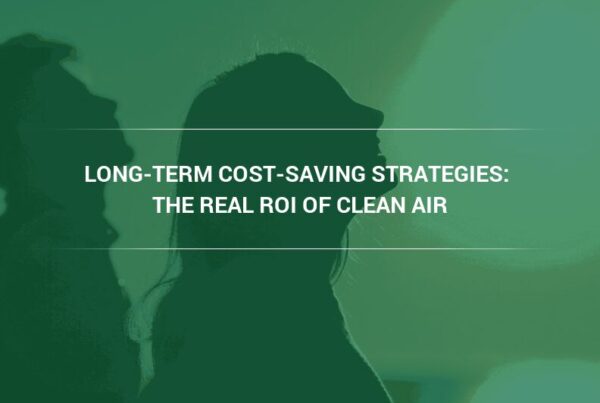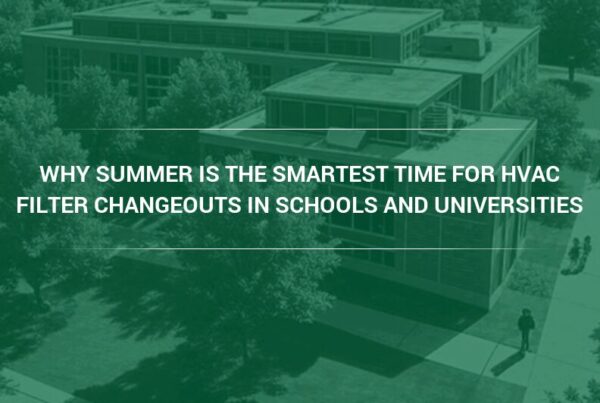When summer hits and temperatures soar, our air conditioning systems work overtime to keep us cool. What many people don’t realize is the significant strain on our buildings’ air filters that this causes. Between increased A/C usage, wildfire smoke, and heightened vehicle traffic, summer air quality takes a hit, leaving your filters to handle more dirt, dust, and pollutants than during any other time of the year.
This article explores how summer affects the performance of your air filters and why upgrading to high-quality filters is a crucial step to protect the health of your building and its occupants.
Increased Airflow from Constant A/C Usage
Global temperatures in the summer of 2024 were the hottest on record in the last 175 years, according to NASA, and 2025 is forecasted to be similar. [1]
Your building’s HVAC system keeps employees and guests safe and comfortable during the summer heat, cycling a continuous flow of air to maintain a cool indoor environment. However, this boost in airflow means your air filters have to work harder than usual due to:
- Constant Air Movement: Even if the outdoor air is relatively clean, running your A/C throughout the day pushes a much higher volume of air through your system. That means filters are exposed to more particles simply due to the increased airflow.
- More Wear and Tear: This constant movement of air doesn’t just bring more dirt; it also reduces the lifespan of your filters as they work to trap an increased amount of dust, pollen, and pet dander within a shorter time span.
As a result, filters clog faster, reducing their efficiency while increasing pressure drop and forcing the HVAC system to work even harder, which can lead to higher energy bills and wear on sensitive parts of the system.
Why Air Quality Suffers in the Summer
Even if air quality were to remain consistent as outdoor temperatures increase, the corresponding increase in air conditioning use would strain air filters. However, there are a number of major factors that increase outdoor air pollution, resulting in poor air quality both in and outdoors. [2]
Wildfire Smoke
Wildfire season in recent years has extended into all four seasons, but dry conditions and high temperatures mean that the worst wildfires often occur during the summer. Wildfires release massive amounts of smoke, ash, and particulate matter into the air.
Standard air filters struggle to handle this influx of smoke and fine particulates, meaning your filters can clog faster, reducing airflow and tanking indoor air quality. Wildfire smoke, carried by wind, can impact areas far from the fires themselves, leading to haze and noticeable air pollution hundreds or even thousands of miles away.
Increased Road Traffic
Summer is peak travel season, with more vehicles on the road producing higher emissions of pollutants such as carbon monoxide, ground-level ozone, and particulate matter.
Ground-level ozone forms when specific pollutants react chemically in sunlight. These pollutants, such as nitrogen oxides and volatile organic compounds (VOCs), come from a variety of industrial sources, in addition to emissions from driving and refueling cars and trucks.
Standard HVAC filters are only able to capture particulate pollution; gaseous pollutants such as ozone are too small to be captured even by HEPA filters. To target this kind of pollution, molecular filters, which use activated carbon or other activated media to capture pollutants through a chemical process called adsorption, are needed.
READ MORE: What You Should Do During Ozone Alerts, According to Air Quality Experts
Arid Weather Conditions
Weather-related factors can increase particulate matter levels in certain areas. Extended dry periods cause dirt, sand, and soil to become loose and dry, unlike their stable, compact state during other seasons. This loose ground is more easily dispersed by wind, vehicles, and foot traffic, and combined with the overall increase in road traffic during the summer, this can potentially double particulate matter concentrations in the area.
Bonfires and Campfires
Bonfires and campfires, a common summer activity, can have a major impact on air quality. Burning wood produces incomplete combustion, releasing pollutants like particulate matter (PM), carbon monoxide (CO), volatile organic compounds (VOCs), and other toxins. Fine particulate matter is especially harmful, as it can penetrate deep into the lungs, posing serious risks for those with asthma, COPD, or other respiratory conditions. Fire smoke can also irritate the eyes, nose, and throat, impacting both personal health and overall air quality.
Summer Thunderstorms
Summer thunderstorms create unique weather conditions that can trigger asthma attacks in susceptible individuals. Unlike storms in other seasons, these conditions cause a specific distribution of plant spores and pollen. Downdrafts of cold air concentrate allergens near the storm and carry them into the clouds, where lightning, wind, and high humidity break them into smaller particles. These tiny fragments can bypass the body’s natural defenses and enter the lungs when inhaled. Known as “thunderstorm asthma,” this phenomenon has led to hospitalizations and, in severe instances, deaths.
Why You Should Consider Upgrading to Premium Air Filters
The combination of increased A/C use, wildfire smoke, and vehicle traffic during summer makes one thing clear: your standard, inexpensive commercial air filters aren’t enough during this high-demand season.
Instead of replacing prefilters every quarter and final filters every six months, consider upgrading to premium air filters, specifically designed to handle higher volumes of airflow and finer particles like smoke and smog. Advantages include:
- Extended Lifespan: Higher-quality prefilters can last 9-12 months, compared to three months (or less) and premium final filters can last 24 – 36 months, spanning several higher-pollution seasons. You’ll save time, money, and labor by cutting down on replacements and preventing costly damage to the HVAC system, which can lead to potential system shutdowns.
- Better Air Quality: Premium filters trap more pollutants and allergens, providing cleaner air and all of the benefits that come with it for your building’s occupants.
- Improved Efficiency: By keeping your HVAC system running smoothly, top-tier filters can even reduce your energy use and lower your energy bills.
Switching to premium air filters isn’t just about convenience; it’s a proactive step to safeguard the health of your company’s employees and guests and ensure your HVAC system maintains operation at peak efficiency despite the challenges of summer air quality.
To capitalize on the benefits that premium air filters offer, consider consulting with an air filter specialist. These industry experts can assess your specific needs based on your building’s HVAC equipment, its size, occupancy, and geographic location, relying on their decades of commercial air quality experience to recommend the most effective filtration solutions. Engaging with a specialist ensures that your investment in air quality is both strategic and cost-effective, ultimately leading to a healthier environment for everyone in your building. Connect with your local Camfil representative today: https://www.camfil.com/en-us/support-and-services/support/contact-locator
About Camfil
The Camfil Group is headquartered in Stockholm, Sweden, and has 29 manufacturing sites, six R&D centers, local sales offices in 35+ countries, and 5,700 employees and growing. We proudly serve and support customers in a wide variety of industries and communities across the world. To discover how Camfil USA can help you to protect people, processes, and the environment, visit us at www.camfil.us.
Sources:
[1] Younger, S. (2024, September 11). NASA Finds Summer 2024 Hottest to Date. NASA; NASA. https://www.nasa.gov/earth/nasa-finds-summer-2024-hottest-to-date/
[2] Davidson, M. (2024, July 3). Insights from Air Pollution Experts: Do Fireworks Make Summer Air Quality Worse? Clean Air Blog; Camfil. https://cleanair.camfil.us/2024/07/03/insights-from-air-pollution-experts-do-fireworks-make-summer-air-quality-worse/



